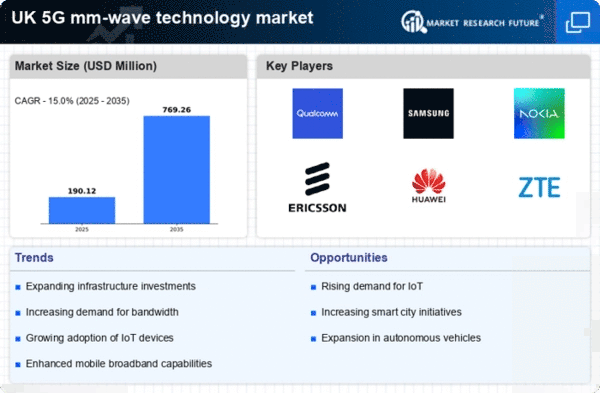Growth of Smart Cities Initiatives
The development of smart cities in the UK is a pivotal driver for the 5g mm-wave-technology market. As urban areas evolve to incorporate advanced technologies, the need for reliable and high-speed connectivity becomes paramount. The UK government has launched several initiatives aimed at creating smart cities, which are expected to require extensive 5g mm-wave infrastructure. This transition is anticipated to generate a market opportunity worth over £10 billion by 2030. The integration of 5g mm-wave technology into smart city projects will facilitate efficient traffic management, enhanced public safety, and improved energy management, thereby reinforcing the market's growth trajectory.
Emergence of Edge Computing Solutions
The emergence of edge computing solutions is significantly impacting the 5g mm-wave-technology market. By processing data closer to the source, edge computing reduces latency and enhances the performance of applications that rely on real-time data. In the UK, the edge computing market is expected to grow at a CAGR of 25% over the next five years, indicating a strong alignment with the capabilities of 5g mm-wave technology. This synergy is likely to drive the adoption of 5g mm-wave solutions across various sectors, including manufacturing, healthcare, and transportation, as businesses seek to optimize their operations and improve service delivery.
Rising Demand for High-Speed Connectivity
The 5g mm-wave-technology market is experiencing a surge in demand for high-speed connectivity, driven by the increasing reliance on digital services across various sectors. Businesses and consumers alike are seeking faster internet speeds to support activities such as streaming, online gaming, and remote work. In the UK, the demand for high-speed internet is projected to grow by approximately 30% over the next five years, indicating a robust market potential for 5g mm-wave technology. This demand is further fueled by the proliferation of smart devices and the need for seamless connectivity, which positions the 5g mm-wave-technology market as a critical enabler of the digital economy.
Advancements in Telecommunications Infrastructure
The 5g mm-wave-technology market is significantly influenced by advancements in telecommunications infrastructure. The UK government has committed to investing £1.5 billion in enhancing digital infrastructure, which includes the deployment of 5g networks. This investment aims to improve connectivity in urban and rural areas, thereby expanding the reach of high-speed internet services. As telecommunications companies upgrade their infrastructure to support 5g mm-wave technology, the market is likely to witness accelerated growth. Enhanced infrastructure not only facilitates faster data transmission but also supports the increasing number of connected devices, thereby driving the demand for 5g mm-wave technology.
Increased Adoption of Augmented and Virtual Reality
The 5g mm-wave-technology market is poised for growth due to the rising adoption of augmented reality (AR) and virtual reality (VR) applications. These technologies demand high bandwidth and low latency, characteristics that are inherent to 5g mm-wave technology. In the UK, the AR and VR market is projected to reach £1.2 billion by 2026, creating a substantial demand for the underlying 5g mm-wave infrastructure. As industries such as gaming, education, and healthcare increasingly leverage AR and VR, the need for robust connectivity solutions will likely propel the 5g mm-wave-technology market forward, making it a key player in the digital transformation landscape.
















